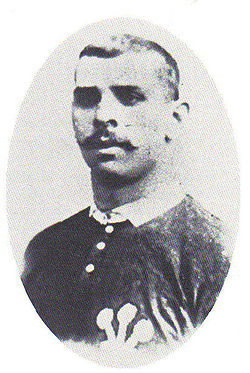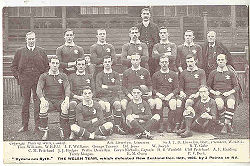- David Jones (rugby)
-
For other people of the same name, see David Jones.For other people of the same name, see Davy Jones.For the rugby union footballer of the 1900s for Wales, Monmouthshire, Pontymoile, Newport, Pontypool, and London Welsh, see David Phillips Jones. For the rugby union and rugby league footballer of the 1920s for Wales (RU), Newport, and Wigan (RL), see David Jones (rugby born circa-1901). For the rugby league footballer of the 1960s for Wales, and Halifax, see David Jones (rugby league). For the current rugby union footballer for Wales, and (Llanelli) Scarlets, see Dafydd Jones.
David Jones 
Dai Jones in Wales jersey Full name David Jones Place of birth Aberaman, Wales Place of death Aberdare, Wales Height 185.5 cm (6 ft 1.0 in) Weight 98 kg (15 st 6 lb) Occupation(s) collier
police officer
landlordRugby league career Position Forwards Professional clubs Years Club / team Caps (points) 1907-? Merthyr Tydfil RLFC National teams Years Club / team Caps (points) 1908
1908Wales
Great Britain1
2(3)
(0)Rugby union career Playing career Position Forward Amateur clubs Years Club / team ?-1902
1902-1906
1906-1907
?
?Treherbert RFC
Aberdare RFC
Treherbert RFC
Glamorgan Police RFC
Glamorgan County RFCNational team(s) Years Club / team Caps (points) 1902-1906 Wales 13 (0) David "Tarw" Jones (1881- 21 January 1933)[1] (also known as Dai Jones) was a Welsh international rugby union and rugby league player. He was a member of the winning Welsh team who beat the 1905 touring All Blacks in a game considered one of the greatest in the history of rugby union. Jones is the only Welsh player to have been part of a team to have beaten the All Blacks in the union and league game[2] and is the second dual-code international rugby player from the Northern Hemisphere.
David Jones gained his nickname Tarw (Welsh for bull) from his imposing stature; standing at 6’1’’ and weighing almost 16 stone. A collier from Aberaman[3] who later became a policeman before becoming a collier once more, he played club rugby as a forward for Treherbert RFC[4] and then later Aberdare, before switching back to Treherbert. In his later life he was caught in a scandal which saw him banned from rugby union and forced his switch to rugby league.
Contents
Rugby union career
Jones was one of a line of players chosen from clubs in the South Wales valleys to bolster the Welsh forward pack. His first international game was at the age of 20 against England[4] after impressing during a trial at Treherbert in 1901[5] and he would represent his country on another twelve occasions. Jones was a powerful man with a heavy tackle and was used as an impact player; although recognised as a lock forward his international career saw him play in several positions including one game where he was given the number 8 shirt against Ireland in 1905.[6] Jones was part of a very successful Welsh team and was part of two Triple Crown winning sides.
The greatest moment in Jones' international career came in 1905 when he was chosen to face 'The Original' All Blacks in the New Zealanders first tour. The All Blacks had already played 27 games without loss, defeating the best British county and club teams as well as the England, Scottish and Irish national teams. Wales were the present Triple Crown holders and undefeated in the last year and the game was built into a major contest by the press, some going as far as calling it The Game of the Century. Although reported as limping earlier in the week,[7] Jones played his part in a hard fought game, and along with Arthur Harding followed a clear tactical game to give Wales a clear advantage. The All Blacks had proven incredibly strong in their previous games in their scrummage tactics, using seven men instead of the usual eight, but using a wedge formation to force their opponents back and then use the additional man to great advantage when the ball was eventually released. Harding had played the All Blacks earlier in the tour, when he faced them with county side Middlesex, and this insight may have explained the Welsh tactic. The Welsh also used a seven man scrummage pack, but with Jones and Harding staying mobile behind the pack switching sides to prevent the wedge push. The Welsh would eventually win by the narrowest of margins, 3-0.[8]
Five days after facing New Zealand for Wales, Jones was selected to face the same touring side as part of the Glamorgan County team. The county team was poorly represented, as several players from the victorious Wales team had promised to play but eventually dropped out, until only Jones, Will Joseph and Jack Williams remained. The team played well, with some excellent play from Cardiff's Reggie Gibbs. Jones himself was at the centre of two excellent moves; winning a line out and then placing an overhead punt, which Billy Pullen failed to handle correctly at the try line; and his own charge to the line which was just brought short of a try.[9] Glamorgan eventually lost three tries to nil.
Jones would play his last rugby union game for Wales against South Africa in 1906. As part of the Glamorgan County side, Jones had played very well in the sides narrow loss to the South Africans; but in the international he looked tired and ragged, and his normal excellent scrummaging was poor. He retired from the field early, his Wales union career over at the age of just 25.[5]
International rugby union matches
Wales[10]
 England 1902, 1903, 1905, 1906
England 1902, 1903, 1905, 1906 Ireland 1902, 1903, 1905
Ireland 1902, 1903, 1905 New Zealand 1905
New Zealand 1905 Scotland 1902, 1903, 1905, 1906
Scotland 1902, 1903, 1905, 1906 South Africa 1906
South Africa 1906
Scandal
After Jones' international career he would find himself caught up in a scandal surrounding professionalism. Jones was thought to have returned to Treherbert after his weekly payment from Aberdare was cut from 10 to 5 shillings. An ex-secretary of Aberdare told the press that Jones had received payment from the club, which was against amateur union rules. In 1907, after an investigation from the Welsh Rugby Union, Jones was banned from playing rugby union for life.[11]
There are further reports of incidents involving Jones, both on and off the pitch, which help to explain his unconventional character. One story is told that while serving as a police officer in Treherbert he became annoyed with an inspector, Jones reportedly removed his tunic, grabbed hold of the inspector and forcibly ejected him from the station.[12] Another occasion saw him disciplined by the police force for selling raffle tickets while still on duty.[13]
Dual rugby code international
After being banned from playing under union rules, Jones joined professional league teams for Treherbert RLFC and Merthyr Tydfil RLFC and made national representative appearances for Wales in rugby league. His appearance in the first ever full international played against a visiting southern hemisphere side - the New Year's Day 1908 Test against the All Golds at Aberdare saw him become Wales', and the Northern Hemisphere's second dual-code rugby international, just three years after fellow Rhondda player Jack Rhapps. Played on a near frozen pitch, the game was a close match, with Jones scoring a try just minutes before the final whistle, which gave Wales the victory.[14] This result made Jones the first player to play in winning teams against New Zealand under both league and union codes.[15] On the 25 January, just over three weeks later, Jones faced the New Zealand All Golds again, this time representing the Great Britain team.[16] Jones was the only representative from a Welsh club in the British team, with the game played at Headingley in Leeds. The British were victorious, 14-6, and Jones was reselected for the second test against the New Zealand team on 8 February. Great Britain lost the second test, and Jones was not a part of the British team for the third and final test.[17]
Later life
Jones became a publican and ran two pubs, the Eagle Hotel in Aberdare and the Castle Hotel in Treherbert. He would later fight in World War I as a member of the Welsh Guards[2] but was wounded badly at the Battle of the Somme, leaving injuries that effected his health throughout the rest of his life.[18] In 1933 David Jones died in Aberdare, South Wales.
Bibliography
- Billot, John (1972). All Blacks in Wales. Ferndale: Ron Jones Publications.
- Billot, John (1974). Springboks in Wales. Ferndale: Ron Jones Publications.
- Haynes, John (2007). All Blacks to All Golds. Brighouse: League Publications Ltd. ISBN 9781901346173.
- Richards, Alun (1980). A Touch of Glory: 100 Years of Welsh Rugby. London: Michael Joseph. ISBN 071811938X.
- Smith, David; Williams, Gareth (1980). Fields of Praise: The Official History of The Welsh Rugby Union. Cardiff: University of Wales Press. ISBN 0708307663.
- Thomas, Wayne (1979). A Century of Welsh Rugby Players. Ansells Ltd.
References
- ^ Dai Jones player profile Scrum.com
- ^ a b Brendan Gallagher (2008-01-02). "A real pro - 100 years ago". The telegraph. http://www.telegraph.co.uk/sport/main.jhtml?xml=/sport/2008/01/03/srabou403.xml. Retrieved 2008-06-20.
- ^ Ameravan Rugby Foorball Club profile
- ^ a b Smith (1980), pg 136.
- ^ a b Thomas (1979), pg 36.
- ^ Newport Gwent Dragons player profiles
- ^ Prince Gwyn, Gwyn Nicholls and the First Golden Era of Welsh Rugby, David Parry-Jones (1999) pg147. ISBN 1-85411-262-7
- ^ Rugby Relics website
- ^ Billot (1972), pg 35.
- ^ Smith (1980), pg 467.
- ^ Smith (1980), pg 180.
- ^ Richards (1980), pg 109.
- ^ Richards (1980), pg 110.
- ^ Haynes (2007), pg 142.
- ^ Phil Blanche (1 January 2008). "R League: Jones did the double over NZ". Western Mail. http://www.walesonline.co.uk/sports/rugby-league-news/2008/01/01/r-league-jones-did-the-double-over-nz-91466-20301567/. Retrieved 2 August 2010.
- ^ Haynes (2007), pg 146.
- ^ Dai Jones rugby league profile rugbyleagueproject.org
- ^ Smith (1980), pg 163.
Categories:- 1881 births
- 1933 deaths
- Aberdare RFC players
- Treherbert RFC players
- Glamorgan County RFC players
- Glamorgan Police RFC players
- British Army personnel of World War I
- Dual-code rugby internationals
- Great Britain national rugby league team players
- Merthyr Tydfil RLFC players
- People from Aberdare
- Rugby league hookers
- Wales international rugby union players
- Wales national rugby league team players
- Welsh Guards soldiers
- Welsh miners
- Welsh police officers
- Welsh rugby league players
- Welsh rugby union players
Wikimedia Foundation. 2010.

